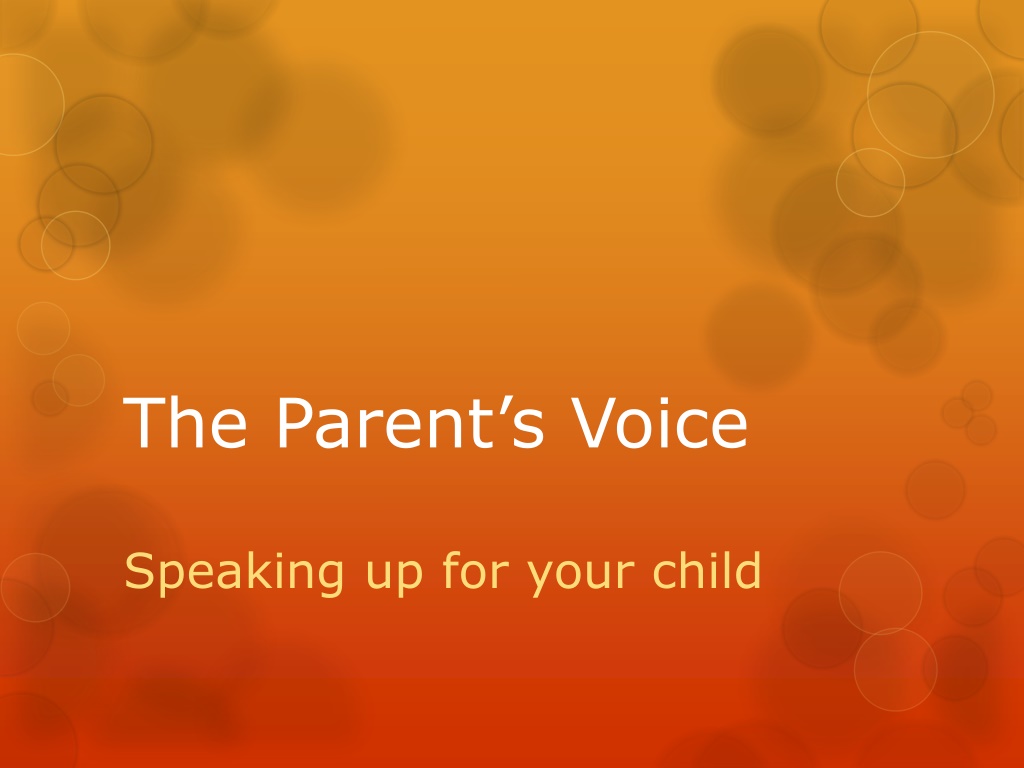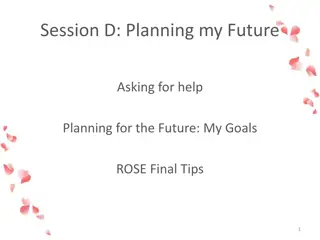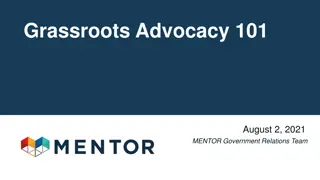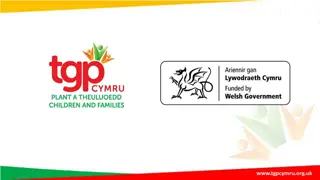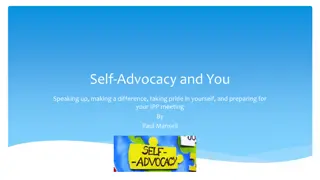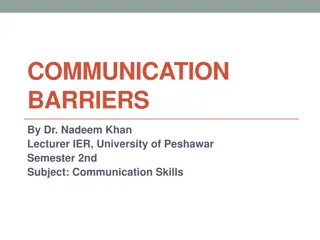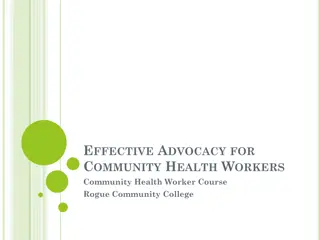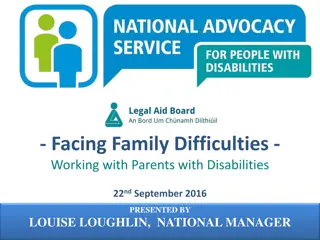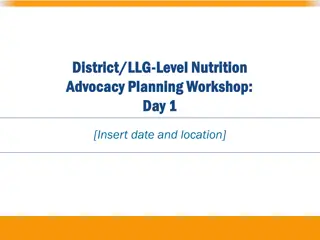Empowering Children Through Advocacy: Speaking Up and Overcoming Barriers
Advocacy involves listening to children, empowering them to voice their wishes and rights, and navigating barriers like jargon and fear of repercussions. This process requires being a practical helper, championing child rights, and ensuring fair treatment in areas like special education needs. The key steps in speaking up include identifying issues, exploring actions, and clarifying policies. To empower children, involve their views, never assume professionals know everything, and ask questions without hesitation.
Download Presentation

Please find below an Image/Link to download the presentation.
The content on the website is provided AS IS for your information and personal use only. It may not be sold, licensed, or shared on other websites without obtaining consent from the author. Download presentation by click this link. If you encounter any issues during the download, it is possible that the publisher has removed the file from their server.
E N D
Presentation Transcript
The Parents Voice Speaking up for your child
What is advocacy? It s listening to the child, helping them to have their voice heard by representing them or helping them to represent themselves It s about learning how to get the information or support you need It s about speaking up for children and young people and empowering them to ensure their wishes and feelings and rights are upheld It s about recognising power imbalances and understanding different rights, roles and responsibilities
Speaking up and the barriers Jargon and acronyms Fear of repercussions Being made to feel like a troublemaker No one is listening Going around in circles Who finds it easy to complain? Who are the professionals here? When it becomes about the fight A listener Independent of services A trusted adult, parent or confidante Empowering Helping build confidence and independence skills A practical helper A champion of a child s rights
A constant battle A common phrase I hear from families when seeking to resolve a complaint about special educational needs provision is that it feels like a constant battle. It should not have to be this way. Special Educational Needs: preparing for the future - Focus report: learning lessons from complaints, Dr Jane Martin, Local Government Ombudsman, 2014. http://www.lgo.org.uk/news/2014/mar/ombudsman-calls-fair-treatment- children-sen/
The process of speaking up Listening to establish the problem; write it down Exploring the possible actions and results Clarify the issues to make sure Establish the policy or legal framework Attempt to solve the problem at a local level
How you can do it Involve the child s views, wishes and feelings as much as possible Never assume that professionals know everything, including the available options Remain task-focussed and specific Never be afraid to ask questions in a variety of different ways
Good practice guidelines Raise any concerns you have as early as possible with your child's teacher. Find out who the SENCO (special educational needs coordinator) is at the school. Find out if the school has a nominated special educational needs (SEN) governor they do not have a duty to provide this, but it is considered good practice; otherwise, the governor s have a collective responsibility. Ask for a copy of the school's SEN policy this may be on the website. Ask for a copy of the local authority's guidance/policy relating to special educational needs. Keep records of discussions and meetings, and a diary of events.
Keep difficulties. a diary about your child and his/her Your child, if appropriate, could keep a diary. Their wishes and feelings are very important and must be considered and communicated to the relevant professionals wherever possible (word for word) Keep chronological copies of all letters If you think it is necessary, send letters recorded delivery (as they can be mislaid) or drop them off Make sure that any deadlines are strictly adhered to. For example, the school or local authority may be obliged to give you information or take action within a certain time limit, and vice versa
Laying a trail Always keep the original versions of any documents you send to the school or local authority - send photocopies. When you receive paperwork check that all relevant documents are included. Minutes can arrive late or not at all request these in writing. Ask for any missing attachments. Read through all documents - highlight or make a list of things you agree or disagree with. Share the letters and notes with your child where appropriate it s important that they gain ownership of these grown up processes it also de-mystifies them. Check any paperwork you receive about your child to make sure it gives his/her correct date of birth, etc.
Preparing for meetings Request copies of your child's school record before the meeting. Read any reports that have been written about your child and highlight any areas that need clarification or are of concern. Mark any relevant sections in the SEND Code of Practice (2015) (or other policies) which relate to your views. Make a list of your views/concerns and any questions you want to ask. Use this list during the meeting and tick off points as they are discussed.
If you would like another, relevant person (or persons) to attend the meeting, ask if they can be invited. Ask someone to go with you to the meeting, if possible, and let the school or local authority know that this is happening. Don't feel pressured to agree to anything in the meeting. Make notes of what is said and, if someone has accompanied you, ask them to take notes as well. Ask if anybody will be taking minutes.
If anything is not clear ask for it to be explained again. Make sure that everything you wanted to discuss has been dealt with; discuss some points again if necessary. After the meeting, write a letter to the chairperson, with copies to all present as a matter of courtesy, to confirm your understanding of what was discussed and any actions/deadlines agreed. This is more empowering than waiting for the Minutes.
Writing letters Make sure that your letter contains full details of your child, i.e. name, date of birth, the school your child attends, etc. Also quote any references, e.g. tribunal hearing number. Always keep a copy of any letters you send. Send letters by recorded delivery where necessary. Wherever possible, address letters personally, i.e. by using the name of a Local Authority Officer, head teacher, SENCO or Chair of Governors for example
If you're unsure who to write to at your local authority, address the letter to the Chief Education Officer, Director of Education; Children, Families and Learning; Children s Services etc. Your town/city hall or local library will be able to give you their name, or it will be on the authority's website. Letters should be short, fitting on one side of A4 where possible, and clear in what they are asking. If a response is required, mention this in the closing sentence.
Reach out You are not alone. Others are going through the same experiences that you are. Visit support groups if they don t exist, start one - share email addresses Research the issue by visiting websites such as: www.afasic.org.uk www.specialneedsjungle.com
Derbyshire: Childrens Advocacy Children's rights service We provide lots of ways for children in care to have your say, our aim is to ensure that you have the information that you need to make decisions and to let people know your views and feelings. You can contact us by email: childrens.rights@derbyshire.gov.uk or tel: 01629 532 029. Independent advocacy If you're a vulnerable child or young person you can have an 'independent advocate'. This is someone who'll work with you to represent your views to decision makers and, if you need it, help you to make complaints. An advocate will come and meet you where is best for you and at a time that suits you. For more information please contact Rosie Key, email: rosie.key@derbyshire.gov.uk or text or tel: 07785 315 922.
Fairplay Fairplay supports children and young people with disabilities and additional needs, and their families, across North Derbyshire. Call or email: 01246 203963 - office@fair-play.co.uk Action for Children, Derbyshire Young Carers Service (Chesterfield) Provides support and advice to young carers aged six to 18 years throughout Derbyshire (excluding city of Derby). Offers advice and advocacy, one to one support, support with education, training and employment, respite activities. Call or email Karen Martin: 01246 207752 karen.martin@actionforchildren.org.uk
Healthwatch Derbyshire Healthwatch Derbyshire is an independent voice for the people of Derbyshire. We re here to listen to the experiences of Derbyshire residents and give them a stronger say in influencing how local health and social care services are provided. This is not a substitute for making a formal complaint about a service if you are dissatisfied, but it can work alongside this system, by helping to shine a spotlight on issues that are being experienced by a number of people and strengthening the patient voice. Email or call: enquiries@healthwatchderbyshire.co.uk 01773 880786
The Stuff We aim to promote independence and social inclusion to young disabled people aged between 16-25, who are living in Derby City and Derbyshire. The project was created thanks to funding from the Big Lottery Fund. http://www.thestuff.org.uk/advocacy.php
